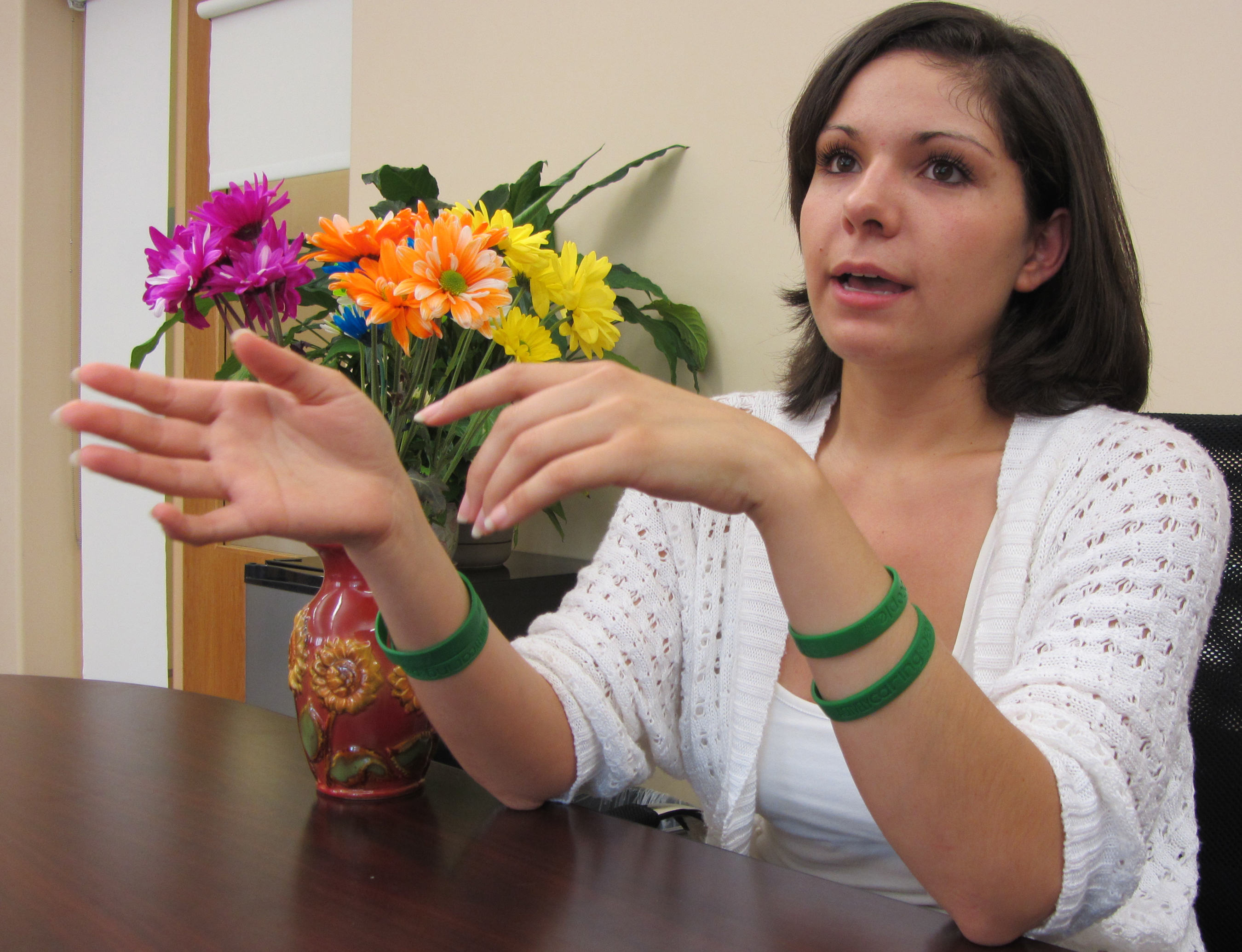Virginia Tech students' pay-it-forward movement travels worldwide

See. Act. Pass. Share. The concept is simple enough. If you observe an act of kindness, thank the person for actively caring, then pass the wristband and ask the person to pass it on. The little green wristband that was first distributed at Virginia Tech in the fall of 2008 has now made its way all over the globe.
Sophia Teie from Washington D.C., a member of Actively Caring for People (AC4P) and a fifth-year student, says a touching moment occurred when she handed her mom’s friend a green wristband in gratitude for a feast while traveling in Peru. "What she appreciated most was the chance that she could pass it on," Teie recalls.
Teie, who is studying psychology and sociology in the College of Science and the College of Liberal Arts and Human Sciences, credits Virginia Tech's E. Scott Geller, Alumni Distinguished Professor at Virginia Tech and director of the Center for Applied Behavior Systems in the Department of Psychology. "He saved lives for 40 years that way," she says.
"That way" is Geller's coining of the concept of actively caring through application of psychology in the workplace to decrease human injury, Teie says; instead of punishment, employees are rewarded when they look out for one another.
"The movement has spread to multiple universities," says movement cofounder Shane McCarty of Arlington, Va., a Pamplin College of Business recent grad who’s now a Ph.D. student in the industrial/organizational psychology program in the College of Science. "Since the website’s inception in January, more than 7,500 unique visitors from every U.S. state and 73 different countries have visited, and they have posted 1,100 actively caring stories."
Among the stories resulting from Virginia Tech students' passing of the green wristbands:
Justin Graves from Fredericksburg, Va., a senior studying sociology in the College of Liberal Arts and Human Sciences, is a Hokie Ambassador well known for giving campus tours backwards from his wheelchair. He once handed a green wristband to a Radford student in a parking lot for helping load groceries into his car. The student's mother learned of the exchange and told her coworker about it – and it turned out the coworker was the mother of Graves' little brother in the Big Brothers Big Sisters program in Blacksburg. "It made me feel happy that such a small story had travelled so far because that guy appreciated his wristband," Graves says.
In another coincidence involving an exchange on the Washington, D.C., metro system, a Louisiana State University student – who oddly enough had earlier befriended AC4P cofounder McCarty – ended up with a green bracelet on her wrist. Her good deed? She had simply smiled at someone who was having a really bad day.
Jessica Cea from Fairfax, Va., a current member of AC4P and a junior studying psychology in the College of Science, says that wristbands are now numbered, which makes tracking possible. A Virginia Tech student recently received wristband #12548 in the mail. It had been sent to him by a young car-accident victim, grateful that he had stayed by her side when her legs were pinned, keeping her company until paramedics arrived. "She said she had a bracelet to give me and wanted my address. A little while later I got the bracelet in the mail," the student said in a Facebook posting.
Currently 50,000 numbered wristbands are in circulation, cofounder McCarty says. That includes wristband #240, which an Appalachian State University student received after helping a man who had crashed his dirt bike through a glass window. The man, who required 200 stitches, was grateful because the student who came to his aid helped keep him from bleeding to death.
"It's like being a modern-day hero," says Rohan Cobb-Ozanne from Blacksburg, also a member of AC4P and a sophomore studying psychology in the College of Science. Cea echoes, "It’s a mark that says I actively care, and it's a daily reminder that you got it for a reason and you need to pass it on."
Popular as the wristbands are, group members want the community to know that wristbands are only one medium by which the mission is carried out. At an AC4P meeting on a recent Thursday evening, students discussed lesson plans that could go into a middle school – in less than five years the movement has grown to tackling the prominent issue of bullying in schools.
The middle school program will deploy Virginia Tech students as mentors. The system will be convenient for teachers, who can make time for the program without the pressure of an additional task to prepare for their students. The mentors will develop a lesson plan that includes an activity to share with the youngsters.
Teie says, "What we didn’t expect at the time was that the mentors themselves change as a result of participating in the program." Some Virginia Tech students have even changed their career plans, choosing to gravitate toward service-oriented professions, she says.
The movement's foundation ties back to the concept of serving others embodied in Virginia Tech's motto Ut Prosim (That I May Serve). "Hokies have a great sense of community," Cea says.




